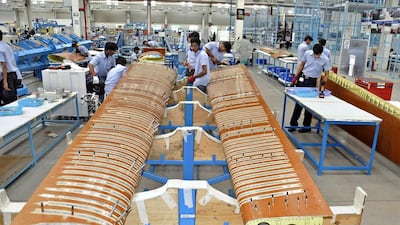India’s Tata Group badly needs to find a new cash machine. The aviation-to-autos and salt-to-steel conglomerate’s existing ATM is Tata Consultancy Services, the nation’s largest software exporter. The code-writing company rakes in more than 180 billion rupees (Dh9.83bn) of annual free cash flow, which more than compensates for the 80bn rupees of cash drain from the group’s other 10 largest publicly traded firms.
That’s a risky dependence. The legacy business of helping global companies customise and deploy large-scale enterprise software products built by the likes of Oracle and SAP is fading. Some analysts expect a price war this year.
Cloud-based applications are gaining ground, but it is unclear whether Indian vendors’ low-cost delivery model will also give them a winning edge in emerging digital technologies.
That should make at least some people in Bombay House, Tata Group’s Mumbai-based headquarters, worry. Unlike Tata Consultancy Services (TCS), none of the other major Indian software exporters, such as Infosys, Wipro or HCL Technologies, belongs to a capital-hungry conglomerate with $38bn of debt. They can plod on. But Tata Steel has a metals meltdown to see off and Tata Motors has to contend with a slowdown in Chinese demand for Jaguar Land Rover (JLR) as well as an underperforming domestic small-car business.
The group also needs money to scale up its two fledgling aviation joint ventures with Singapore Airlines and AirAsia.
On top of that, Tata Group requires resources to become the Indian government’s go-to private sector partner in military production. Yesterday, Tata said that it expects the defence business to have a compound annual growth rate of 10 to 12 per cent. It also said that it expects its Tata Boeing joint venture to start delivering Apache helicopters by 2018.
Sunrise industries beckon, but cash is the best companion for a long night. Where to get it if TCS stagnates?
Borrowing is expensive, even for pedigreed emerging market companies. Dollar loans so far this year have on average cost the group 192 basis points more than the benchmark London Interbank offered rate. That’s cheaper than during the 2013 Federal Reserve taper scare but slightly higher than last year.
To strike back at its cash challenge, the empire must first shrink. Tata Steel is trying to sell off part of its European business; Indian Hotels, which operates The Pierre in New York, is looking to sell assets to cut its debt by about 30 per cent. Bolder steps might be needed.
The group’s chairman, Cyrus Mistry, wouldn’t upset investors if he decided to get rid of Tata Motors’ non-JLR passenger car business – his predecessor, Ratan Tata, failed to sell it to Ford in 1999 – and got TCS to make a big acquisition instead. Ratan Tata’s 2008 purchase of JLR – incidentally, from Ford – was an inspired decision, although at the time it smacked of expansionism, particularly since the transaction followed an $8bn takeover of the British steelmaker Corus in 2006.
Mr Mistry should hope to bag the next JLR, rather than another Corus. One good target might be IBM, whose shares are trading close to a five-year low and at a price-to-earnings multiple of slightly more than 10, about half TCS’s valuation. The New York-based company could take several years to complete a successful transition from legacy businesses towards analytics, cloud, mobile and security, but meanwhile it is still generating more than $13bn in free cash every year.
The Tata group is unlikely to find another local cash cow as good as TCS. So why not make it fatter with a daring acquisition?
business@thenational.ae
Follow The National's Business section on Twitter

